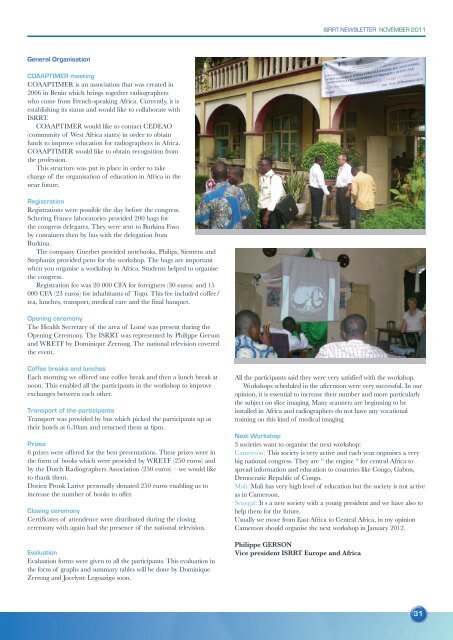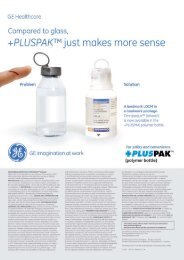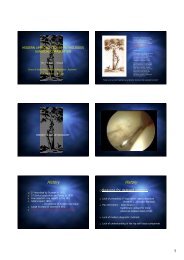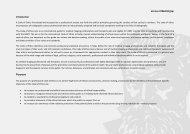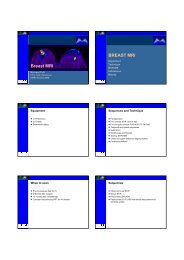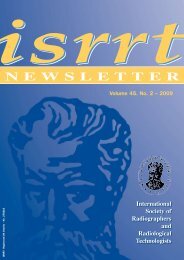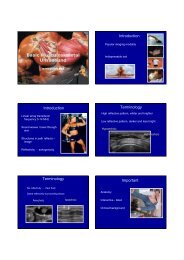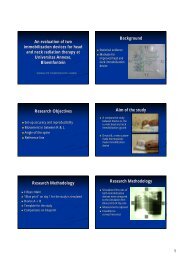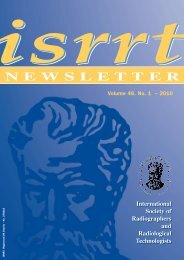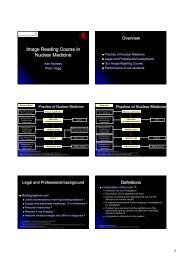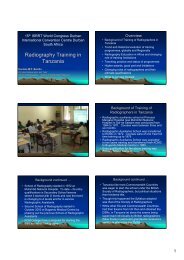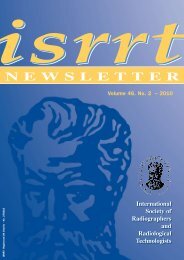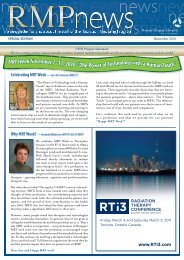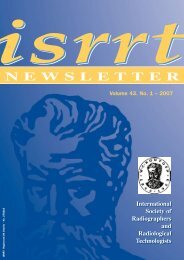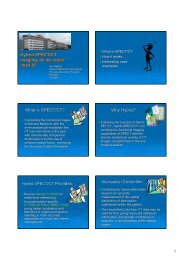Download - ISRRT
Download - ISRRT
Download - ISRRT
You also want an ePaper? Increase the reach of your titles
YUMPU automatically turns print PDFs into web optimized ePapers that Google loves.
<strong>ISRRT</strong> NEWSLETTER NOVEMBER 2011<br />
General Organisation<br />
COAAPTIMER meeting<br />
COAAPTIMER is an association that was created in<br />
2006 in Benin which brings together radiographers<br />
who come from French-speaking Africa. Currently, it is<br />
establishing its status and would like to collaborate with<br />
<strong>ISRRT</strong>.<br />
COAAPTIMER would like to contact CEDEAO<br />
(community of West Africa states) in order to obtain<br />
funds to improve education for radiographers in Africa.<br />
COAAPTIMER would like to obtain recognition from<br />
the profession.<br />
This structure was put in place in order to take<br />
charge of the organisation of education in Africa in the<br />
near future.<br />
Registration<br />
Registrations were possible the day before the congress.<br />
Schering France laboratories provided 200 bags for<br />
the congress delegates. They were sent to Burkina Faso<br />
by containers then by bus with the delegation from<br />
Burkina.<br />
The company Guerbet provided notebooks, Philips, Siemens and<br />
Stephanix provided pens for the workshop. The bags are important<br />
when you organise a workshop in Africa. Students helped to organise<br />
the congress.<br />
Registration fee was 20 000 CFA for foreigners (30 euros) and 15<br />
000 CFA (23 euros) for inhabitants of Togo. This fee included coffee/<br />
tea, lunches, transport, medical care and the final banquet.<br />
Opening ceremony<br />
The Health Secretary of the area of Lomé was present during the<br />
Opening Ceremony. The <strong>ISRRT</strong> was represented by Philippe Gerson<br />
and WRETF by Dominique Zerroug. The national television covered<br />
the event.<br />
Coffee breaks and lunches<br />
Each morning we offered one coffee break and then a lunch break at<br />
noon. This enabled all the participants in the workshop to improve<br />
exchanges between each other.<br />
Transport of the participants<br />
Transport was provided by bus which picked the participants up at<br />
their hotels at 6.30am and returned them at 6pm.<br />
Prizes<br />
6 prizes were offered for the best presentations. These prizes were in<br />
the form of books which were provided by WRETF (250 euros) and<br />
by the Dutch Radiographers Association (250 euros) – we would like<br />
to thank them.<br />
Dorien Pronk Larive personally donated 250 euros enabling us to<br />
increase the number of books to offer.<br />
Closing ceremony<br />
Certificates of attendence were distributed during the closing<br />
ceremony with again had the presence of the national television.<br />
Evaluation<br />
Evaluation forms were given to all the participants. This evaluation in<br />
the form of graphs and summary tables will be done by Dominique<br />
Zerroug and Jocelyne Legoazigo soon.<br />
All the participants said they were very satisfied with the workshop.<br />
Workshops scheduled in the afternoon were very successful. In our<br />
opinion, it is essential to increase their number and more particularly<br />
the subject on slice imaging. Many scanners are beginning to be<br />
installed in Africa and radiographers do not have any vocational<br />
training on this kind of medical imaging.<br />
Next Workshop<br />
3 societies want to organise the next workshop:<br />
Cameroon: This society is very active and each year organises a very<br />
big national congress. They are “ the engine “ for central Africa to<br />
spread information and education to countries like Congo, Gabon,<br />
Democratic Republic of Congo.<br />
Mali: Mali has very high level of education but the society is not active<br />
as in Cameroon.<br />
Senegal: It s a new society with a young president and we have also to<br />
help them for the future.<br />
Usually we move from East Africa to Central Africa, in my opinion<br />
Cameroon should organise the next workshop in January 2012.<br />
Philippe GERSON<br />
Vice president <strong>ISRRT</strong> Europe and Africa<br />
31


